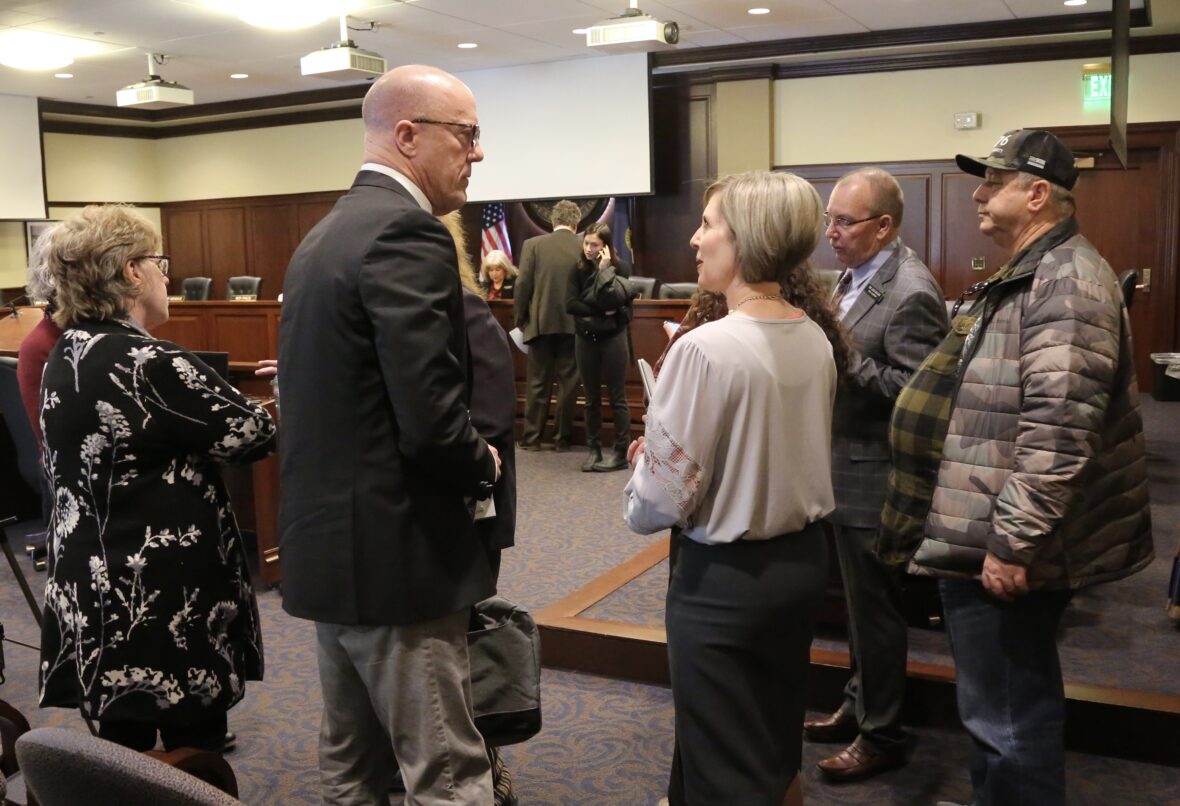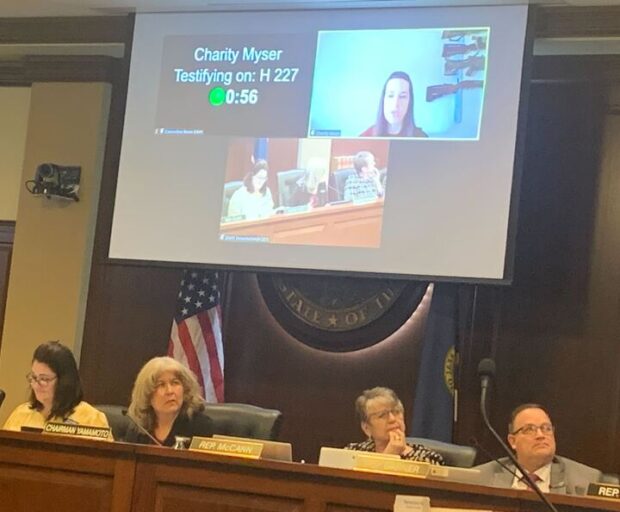
Gov. Brad Little heard from librarians from Rexburg to Riggins, from Donnelly to Bonners Ferry.
He heard from lawyers. From students and homeschoolers. From teachers past and present — including two of Idaho’s past teachers of the year.
And in the end, Little came down on their side. He vetoed a bill mandating that school and public libraries keep “harmful” materials out of the hands of minors, or risk a $2,500 civil fine.
The April 5 veto came at the conclusion of the 2023 legislative session, and after an outpouring of opposition.
In the two weeks leading up to the veto, Little’s office received nearly 2,000 emails urging the governor to reject House Bill 314 — a combination of form emails and personal appeals from Idahoans who found themselves on the front lines of one of the session’s most emotional debates.
Meanwhile, only 49 people emailed Little urging him to sign HB 314.
The emails, obtained by Idaho Education News through a public records request, illustrate the controversy that swirled around the so-called “library porn” bill. The emails also set the parameters for a debate about the state’s libraries — a debate that remains unresolved, and seems destined to resurface in an election-year 2024 legislative session.
An end-of-session showdown
To gauge public feedback, Idaho EdNews requested emails to the governor’s office for the two weeks leading up to Little’s veto — from March 22 through April 5.
Idaho EdNews received more than 2,000 emails, including some duplicates.
The emails reached the governor’s office as the debate over HB 314 reached a crescendo.

On March 22, the Senate sent the House-passed bill to the Senate floor for amendment.
The Senate passed the bill on the evening of March 30.
Barely 12 hours later, the House reconvened on the morning of March 31, giving HB 314 its final approval and sending it to Little’s desk. HB 314 was one of the last bills the House passed this year; after the March 31 floor sessions, the Legislature went into a six-day recess, which allowed lawmakers to wait and see if Little would veto any bills passed in the waning days of the session.
Little vetoed HB 314 late in the afternoon of April 5, a day before his deadline to act on the bill.
During a question-and-answer session with Statehouse reporters Wednesday, Little criticized lawmakers for sending him a flood of late-session bills, including the library bill.
“I didn’t know a darned thing about it until I read it sitting in there,” said Little, motioning toward the desk in his work office.
But in truth, HB 314 did not sneak up on Little — or at least it shouldn’t have. Lawmakers had been talking about some form of a “library porn” bill for weeks.
And of course, before HB 314 arrived on Little’s desk, the phone calls began coming in, and the emails began filling his inbox.
A flood of email opposition, with recurring themes
The one-sided email traffic far exceeded phone calls on HB 314. Little’s office received about 800 calls on the bill, roughly split between supporters and opponents, spokeswoman Madison Hardy said Thursday.
Meanwhile, many of the emails were repetitive — identically worded and generated through third parties such as Do Gooder, an Australian-based site that offers “software to lobby policymakers and build progressive movements.” In many cases, but not all cases, people submitting a Do Gooder email identified themselves as Idahoans, adding an Idaho zip code to their signature.
The form messages certainly skew the numbers, and help explain why emails ran against HB 314 at nearly a 40:1 ratio. But the boilerplate opposition also hit on one issue that figured prominently in Little’s veto: a clause allowing parents or guardians to seek a $2,500 civil fine against libraries that violated HB 314.
“Allowing any parent, regardless of intention, to collect $2,500 in automatic fines creates a library bounty system,” wrote Little in his April 5 veto message to House Speaker Mike Moyle.
While Little echoed the “bounty” language popular with many HB 314 opponents, his veto on the library bill was also a late-session one-off.
Many people who urged Little to veto HB 314 asked him to do the same with two other late-session bills: House Bill 71, which outlaws gender-affirming medical care; and House Bill 242, which bans “abortion trafficking” of minors. Critics lumped the three bills together — describing them all as the work of a Legislature bent on injecting itself into social issues.
Little signed HB 71 and HB 242 before ultimately vetoing the library bill. On Wednesday, he deflected a question about why he singled out the library bill for a veto — noting that he also heard from a number of Idahoans urging him to sign all three of the bills.
An existential debate, with education overtones
Not surprisingly, library staffers and trustees from across the state described HB 314 in existential terms — a threat to public institutions, and to their livelihood.
“PLEASE PLEASE don’t sign HB 314,” wrote Riggins city librarian Susan Hollenbeak, who doubles as the small town’s deputy city clerk. “Being a librarian is a great job!”
“I support my family as a public children’s librarian by enriching the lives of children and families in the community I serve in Idaho,” wrote Mary Flamino of Nampa. “If HB 314 is enacted I will certainly be forced to leave this state and pursue my career as a librarian elsewhere in order to support my family.”
Educators noted that the language in HB 314 extended to school libraries as well as public libraries — requiring staff to prevent access to materials deemed harmful to minors, or risk a similar $2,500 fine.
“My entire library budget for the year is only $3,000,” wrote Whitney Moses, librarian at South Hills Middle School in Twin Falls. “Am I supposed to go through my whole library destroying any book that mentions a homosexual relationship or I’ll have a bounty on my head?”
“Our elementary school librarians make around $20 per hour,” said Allison Katsumoto, a kindergarten teacher in the Boise School District. “We will lose them if this bill passes.”
Two past Idaho teachers of the year — 2022 honoree Todd Knight of the West Ada district and 2018 honoree Rebecca Mitchell of Caldwell — urged Little to veto HB 314. And other teachers described HB 314 as an existential threat to their profession as well. They said the restrictions on library materials, and the risk of a civil fine, could create a chilling effect that extends into the classroom.
Even though HB 314 did not directly address teachers — and contained language designed to protect materials with “literary, artistic, political or scientific” merit.
“We do not want to lose our jobs because we disagree with the public about ‘literary merit,’” said Cora Irelan, a Moscow High School English teacher. “Thus, we are left only with the option of not teaching most of what is in our curriculum. Our students will not be exposed to ancient Greek and Roman epics, nor to Shakespeare, nor even to Mark Twain.”
The smattering of support
Little received only 49 emails urging him to sign HB 314. But these emails also underscore support from within GOP circles.
“If it is unlawful and wrong for you or me to distribute obscene materials to kids, it is wrong for a library or school to do it,” said Nina Beesley or Rathdrum, GOP chair in North Idaho’s legislative District 3. “The content and damage are the same.”
Ada County Republican Chairman Victor Miller urged Little to sign HB 314.
So did Brent Regan — a board member of the Idaho Freedom Foundation, and chairman of the Kootenai County Republican Central Committee, which endorsed then-Lt. Gov. Janice McGeachin, not Little, in the 2022 GOP gubernatorial primary.
And support from within local Republican ranks virtually assures that the GOP-dominated Legislature will pick up the library debate again in 2024 — months before all 105 legislative seats will be up for election, and any number of Republican incumbents could face contested party primaries in May.
The next chapter
On April 6, the House narrowly failed to override Little’s veto of HB 314, on a 46-24 vote that fell just short of the required two-thirds majority. Minutes later, the House adjourned the 2023 session.
In a postsession news conference later that afternoon, Moyle predicted the library bill would be back — perhaps without the $2,500 civil fine that crystallized opposition. “I think everything else would have flown without that,” said Moyle, R-Star.
To be sure, the fine wasn’t the only contentious element of HB 314. Critics also said this year’s bill was subjective, since it attempted to restrict materials deemed harmful to minors, “applying contemporary community standards.” Concerns about definitions and subjectivity, another recurring theme from the flood of emails to Little, are almost certain to resurface next session.
The email traffic in the governor’s office illustrated public concerns about HB 314 — but in the end, that outcry might hold only so much sway.
HB 314 passed both houses comfortably, and the House fell only one vote shy of overriding Little’s veto — and setting up one final end-of-session showdown on the Senate floor.
Acknowledging that narrow override vote, Little said the Legislature sent a message to some of HB 314’s most vociferous critics — the state librarians and library trustees. The issue will surely come back in 2024, Little said. The onus is on libraries to work out a compromise that protects children, while eliminating some of the most troublesome language from this year’s proposal.
“Let’s see what we can do collectively to not have this come back,” Little said.
Kevin Richert writes a weekly analysis on education policy and education politics. Look for his stories each Thursday.
